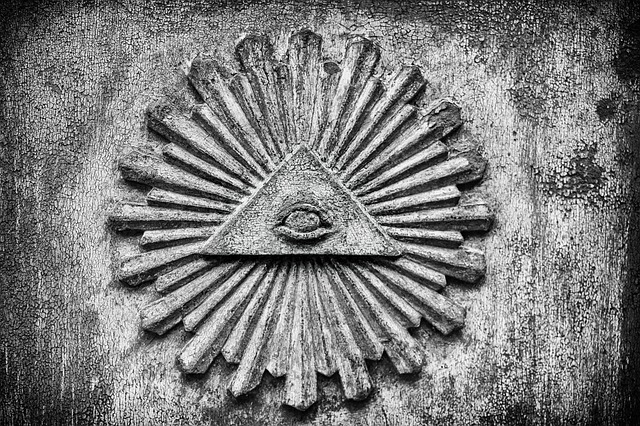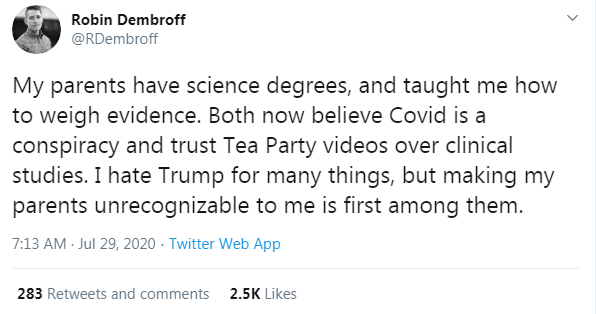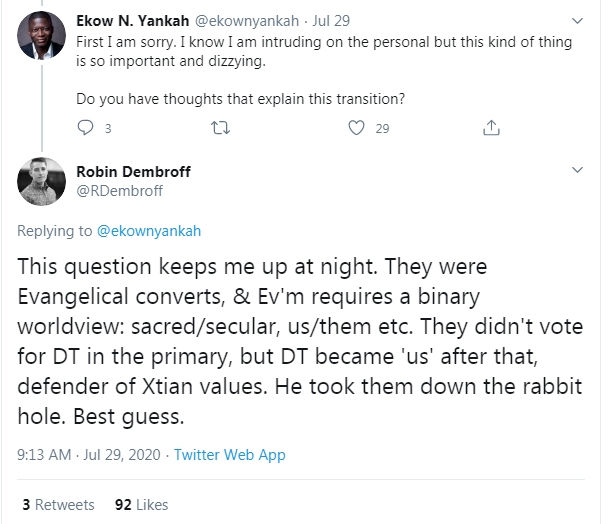
Of all the strange things that have spawned in the muck of the Trump era, none is stranger than QAnon.
QAnon is a conspiracy-theory-slash-cult that emerged around the beginning of Trump’s presidency. For a few years, it was confined to the fringe of the fringe, but it’s gained adherents and prominence and now threatens to engulf the entire right wing. The United States has a long and colorful history of conspiracy theorizing, but this one may be the most outlandish one that’s ever emerged – not to mention the one that’s gained the most currency in the halls of power.
As with many religions, the details of QAnon vary with the teller. But in its loose outlines, it posits that Donald Trump is actually a heroic crusader waging war on a vast and sinister cabal of Satan-worshipping child molesters whose members include deep-state bureaucrats, Democratic politicians, Hollywood liberals and international financiers.
The conspiracy states that Trump’s tweets and other public communications contain coded messages to the faithful, which are interpreted by the prophet of the movement: an anonymous poster known as “Q” who first appeared on the message board 4chan. “Q” is supposedly a high-ranking government official, and in some interpretations, even Donald Trump himself.
Like all doomsday cults, QAnon looks forward to the apocalypse: a day called “The Storm” when Trump will go public, smash the conspiracy, imprison the child traffickers and vindicate the true believers. The exact date when this is supposed to occur keeps changing – Q himself has made numerous false predictions – but that hasn’t dissuaded the faithful in the slightest. They continue to believe the reckoning will arrive Real Soon Now.
Written out like this, it sounds too bizarre to believe. It seems like either the distilled ramblings of paranoid schizophrenia or an elaborate practical joke. But to those who are enmeshed in it, QAnon is deadly serious.
Stories like this one from MEL Magazine recount heartbreaking tales of broken relationships and shattered families. People have lost parents, partners and loved ones who’ve fallen under the sway of the cult. In the throes of their toxic obsession, they cut off everyone who won’t affirm their beliefs, or even accuse skeptics of being part of the conspiracy too. (The Reddit forum r/QAnonCasualties has many stories like this.)
According to U.S. military and law-enforcement officials, QAnon poses a real threat. Although the cult has no overarching organization or unified set of demands, its extreme rhetoric has already inspired some of its most radical and unstable followers to commit or plan acts of violence.
The most infamous case is Edgar Maddison Welch, a believer in “Pizzagate” – an early, smaller-scale version of QAnon which claimed that a Washington, D.C. pizza place was a hub of child sex trafficking – who stormed into the restaurant firing an assault rifle, in an attempt to rescue these non-existent children. In July, a Canadian QAnon believer rammed his truck into the gates of Rideau Hall, the residence of Prime Minister Justin Trudeau. Another QAnon follower was arrested in April on charges of plotting to kill Joe Biden.
All this would be bad enough, but QAnon is bigger than a mob of tinfoil-hatted cranks posting their late-night ravings on the internet. These beliefs have filtered up to high levels of the Republican party – which shouldn’t come as a surprise, considering the feverish atmosphere of paranoia and anti-intellectualism that prevails among them.
As of July 2020, at least 75 current or former Republican candidates for Congress embrace QAnon. Eric Trump has promoted it. Trump’s former national security adviser Michael Flynn posted a video of himself taking a QAnon loyalty oath. The head of New York’s police union has given interviews with QAnon symbolism in the background.
Nor have high-ranking Republicans gone on the record to reject QAnon. On the contrary, they’ve remained silent at best, endorsed or quietly supported some of the fringe candidates at worst. It’s the same awkward shuffle that less-fanatical Republicans have had to practice throughout the Trump years, trying to keep the unsavory elements of their party at arm’s length, but not disavowing them outright because these people are part of their voting base and they can’t afford to go without their support.
Something else that outside observers have noticed is that belief in QAnon and similar conspiracy theories correlates with evangelical Christian beliefs. For example, the Pizzagate shooter Welch was known for being fervently religious. Another case in point:


Writing for Christianity Today, Ed Stetzer is baffled and dismayed by this pattern:
Sadly, Christians seem to be disproportionately fooled by conspiracy theories. I’ve also said before that when Christians spread lies, they need to repent of those lies. Sharing fake news makes us look foolish and harms our witness.
…If you still insist on spreading such misinformation, would you please consider taking Christian off your bio so the rest of us don’t have to share in the embarrassment?
Marc-André Argentino, a scholar studying the rise of extremist ideologies, reports that QAnon virtual gatherings are becoming bona fide churches. The biggest of these groups, Omega Kingdom Ministries, holds regular Sunday services where QAnon ideas are hybridized with dominionist “Seven Mountains” theology:
What I’ve witnessed is an existing model of neo-charismatic home churches — the neo-charismatic movement is an offshoot of evangelical Protestant Christianity and is made up of thousands of independent organizations — where QAnon conspiracy theories are reinterpreted through the Bible. In turn, QAnon conspiracy theories serve as a lens to interpret the Bible itself.
…The service begins with an opening prayer from Wagner that he says will protect the Zoom room from Satan. This is followed by an hour-long Bible study where Wagner might explain the Fall Cabal video that attendees had just watched or offer his observations on socio-political events from the previous week.
Everything is explained though the lens of the Bible and QAnon narratives. Bushey then does 45 minutes of decoding items that have appeared recently on the app called QMap that is used to share conspiracy theories. The last 15 minutes are dedicated to communion and prayer.
The symbiosis between evangelical Christianity and QAnon is the most explicable part of this story, and it’s not just because “Q”‘s messages are sprinkled with quotes from the Bible. It’s because evangelicals already belong to a belief system which discourages critical thinking and primes them to believe exactly this kind of fantasy about invisible enemies and secret cosmic struggles of good versus evil. They’re already accustomed to trawling through the Bible for “prophecies” concealed in vague or metaphorical language.
The only slight difference is that they believe this conflict is playing out in the real world, with real people, rather than in unverifiable supernatural realms. But other than that, QAnon slots neatly into a part of their brains that they’ve spent a long time preparing. It’s a bigger and more convoluted version of the Satanic ritual abuse hysteria that Christians have long preoccupied themselves with.
Although the true believers would never admit it, it’s likely that QAnon came into existence because they know Trump’s presidency isn’t going well. However fervently they praise him, however they stick their fingers in their ears and yell about fake news, they can’t drown out their own awareness that America is in the throes of a pandemic and slumping into deep economic depression, that we’ve become a pariah nation and the laughingstock of the world. They believed Trump would usher in an age of greatness, but instead, he’s turned out to be the pathological liar and incompetent failure his critics always said he was.
This cognitive dissonance causes them psychic pain and discomfort, and like an oyster coating a piece of grit to turn it into a pearl, they’ve coped by smothering it in impenetrable layers of delusion. They’ve concocted a self-contained alternate reality where Trump is a hero and everything is going according to plan. In a perfectly circular argument, the lack of evidence for this conspiracy is just further proof of how sinister and powerful the conspiracy is.
Like other conspiracy theories, QAnon is rife with contradictions and logical gaps. For example: if secrecy is essential and Heroic-Pedophile-Fighter-Trump can’t show his hand until the moment of victory, why is he sending messages telling everyone what’s going on? Surely an international ring of Satanic child traffickers could read Q’s posts for themselves and realize that he’s on to them.
But neither these gaps in logic nor the lack of evidence ultimately matter to QAnon faithful, because they’re not in it out of sincere concern for the truth. The conspiracy attracts them for baser emotional reasons: it gives them a sense of control in a chaotic world, the thrill of being among the privileged few who understand what’s really going on, and the comfort of believing that everything will work out for them in the end. And, like many true believers, defeat only gives them a sense of martyrdom and prods them to cling even harder to their delusions. Whether the good guys win or lose in November, the Republican party, and therefore the United States, will be dealing with the repercussions for a long time to come.